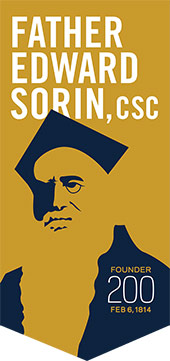About Fr. Sorin
The founder of Notre Dame was born February 6, 1814 in Anhuille, Mayenne, a small village in northwestern France. He was ordained to the priesthood in 1838, joining the group of priests being formed by Fr. Basil Moreau, C.S.C., that would later become the Congregation of the Holy Cross.
Fr. Sorin was inspired by Fr. Moreau’s zeal for evangelization and education. In 1841, he accepted the assignment to lead a group of Holy Cross religious to the United States to found a school in the mission Diocese of Vincennes, Indiana.
On Nov. 26, 1842, when he arrived at what is now the campus of Notre Dame, Fr. Sorin was just 28 years old. The only shelter then standing on the 524-acre site was, Fr. Sorin wrote in his journal, “an old log cabin, 24 × 40 feet, the ground floor of which answered as a room for a priest, and the story above for a chapel for the Catholics of South Bend and the neighborhood, although it was open to all the winds.”
Fr. Sorin's resourcefulness was unmatched. In just over a year, at a time when anti-Catholic sentiments still ran high in the country, he secured an official university charter from the Indiana State Legislature. Fr. Sorin clearly was dreaming big, as he revealed in a letter to Fr. Moreau when he founded the university, believing that Notre Dame would become “one of the most powerful means for good in this country.”
His resolve was tested on April 23, 1879, when a massive fire destroyed the Main Building virtually the entire university. But Father Sorin – always imbued with conviction and hope – was undeterred. He set about to rebuild the Main Building in haste, and the University reopened in four months. Several years later, Fr. Sorin placed the statue of Our Lady on top of a golden dome atop the newly fashioned Main Building.
Fr. Sorin succeeded Fr. Moreau in 1868 as the third Superior General of the Congregation of the Holy Cross. Until his death in 1893, Fr. Sorin's leadership guided both the University of Notre Dame and the congregation to educate future generations in the faith.
Sources:
